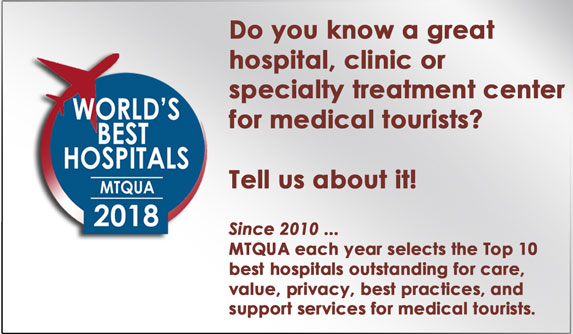In making plans for medical travel, medical tourists are advised to plan ahead for the unexpected – just in case.
Air travel
With careful planning, it is unlikely that medical tourists will have to alter travel arrangements. But should it happen that you need to change flight reservations, it’s good to have insurance against travel delays, or an air ticket that allows changes for a reasonable fee.
Speak to your medical travel planner about medical travel insurance. Review available policies as options vary by company.
Length of stay
Often medical tourists plan to undergo medical treatment during vacation time off from work. Expecting to actually have a vacation along with a medical procedure is not wise. Build in a buffer of a few extra days for recovery (and consider this the “vacation”), but not much more.
Infection control in medical travel
There are cases reported now and again in the world’s press of people who report medical difficulties upon returning home after a medical trip. Most of these are not procedure-related. These are patients who did not receive the correct advice either from their medical travel care manager, their surgeon or their treating doctor about precautions they must take to guard against infections.
Most important advice for medical tourists
STAY AWAY FROM WATER. This may be the most important piece of advice to give any medical traveler.
Stay away from the ocean, from all swimming pools, from hot tubs, from bath tubs and showers.
8 tips to make your medical travel flight home more comfortable
- Be active. Get an aisle seat and take a walk every half hour or so.
- Wear elastic anti-embolism stockings. These should be as long as possible and be careful not to let them roll down and act as a tourniquet. Used incorrectly they can be dangerous and cause problems.
- Don’t sit with anything pressed against the back of your legs for a long time.
- Talk with your surgeon about using aspirin or other blood thinners for a few days around the time of travel.
- Travel lightly. Heavy bags are a nuisance. The more bags you carry the more difficult is the security check and the longer the delays. This may not be a problem before surgery but later you will want a speedy transfer to the departure lounge.
- Tell the airline you have had surgery. This may help when boarding or disembarking.
- If you have obvious swelling or bruising, have a medical certificate from your surgeon to show to airline personnel.
- Fly business class or first class on your return. Premium economy is a good alternative on those airlines that offer it.

 >
>